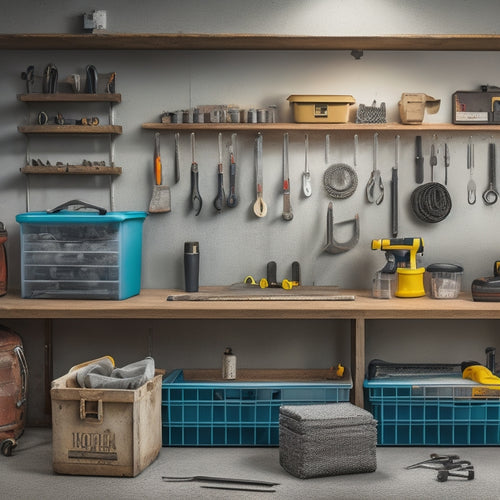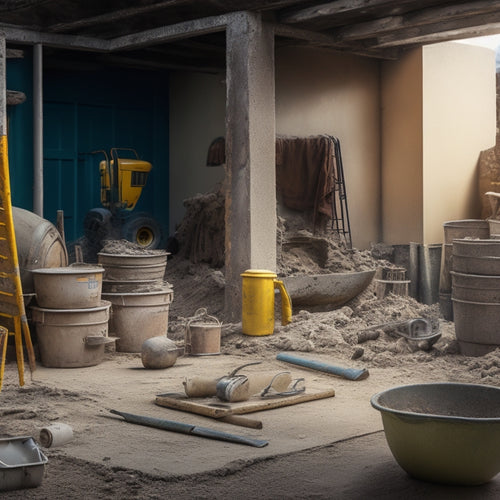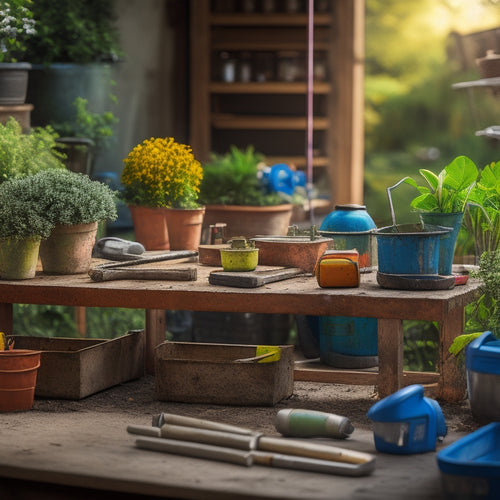
3 Best Tools for Building a Concrete House
Share
When building a concrete house, you'll need a range of specialized tools to guarantee efficient and accurate construction. Three essential tools to get you started are a variety of trowels, including pointing, finishing, and notched trowels, which allow for precise adhesive application and surface finishing. Next, a reliable concrete mixer, such as a drum mixer or tow-behind mixer, is vital for large batches and portability. Finally, a concrete pump is a game-changer for larger pours, reducing labor time and effort. By understanding these tools, you'll be well on your way to creating a solid foundation for your dream home, and there's more to come.
Key Takeaways
• A variety of trowels, including pointing, finishing, and notched trowels, are essential for applying and finishing concrete and mortar.
• Personal protective equipment (PPE) like steel-toed boots, gloves, and safety glasses is crucial for ensuring worker safety during concrete construction.
• A reliable concrete mixer, such as a drum mixer or tow-behind mixer, is necessary for efficient and consistent concrete mixing.
• A set of block laying and finishing tools, including a spirit level, string line, and jointer, is required for accurate block alignment and smooth finishes.
• A concrete pump and vibrating formwork can greatly reduce labor time and effort while ensuring strong and even finishes in concrete construction.
Essential Masonry Construction Tools
When building a concrete house, possessing the right masonry construction tools is essential, as they enable you to efficiently prepare, mix, and place concrete, guaranteeing a strong and durable structure.
Your toolkit should include a variety of trowels, each designed for specific tasks. A pointing trowel, for instance, is ideal for filling small gaps and joints, while a finishing trowel is better suited for smoothing and finishing large surfaces. You'll also need a notched trowel for applying adhesive or leveling compounds.
Masonry safety is paramount, so don't forget to include personal protective equipment (PPE) in your arsenal. Steel-toed boots, gloves, and safety glasses are must-haves when working with concrete. A dust mask or respirator will also protect you from inhaling harmful particles.
Additionally, a level and straightedge will help you guarantee accurate and precise work. A hammer, chisel, and jointer will come in handy for breaking and shaping concrete blocks or bricks.
With these essential masonry construction tools at your disposal, you'll be well-equipped to tackle your concrete house project with confidence and precision.
Concrete Mixing and Pouring Equipment
You'll need a reliable concrete mixer, such as a drum mixer or a tow-behind mixer, to efficiently combine and blend your concrete ingredients.
When it comes to concrete mixer types, you can choose from electric, gasoline, or diesel-powered models, depending on your specific needs and preferences. Drum mixers are ideal for large batches, while tow-behind mixers offer greater portability.
Once you've mixed your concrete, you'll need to pour it into the desired form. Pouring techniques are essential to achieving a smooth, even finish. You can use a chute or a hose to control the flow of concrete, guaranteeing it reaches all areas of the formwork.
For larger pours, consider using a concrete pump, which can greatly reduce labor time and effort. Regardless of the pouring technique you choose, make sure to vibrate the formwork to remove any air pockets and guarantee a strong, durable finish.
With the right concrete mixing and pouring equipment, you'll be able to achieve professional-grade results in your concrete house construction project.
Block Laying and Finishing Tools
Set your block laying process in motion with a set of essential tools, including a spirit level, string line, and block laying trowel. These tools enable accurate alignment, precise course laying, and efficient mortar application. They are vital for achieving professional-looking results and ensuring your concrete house's structural integrity.
When it comes to block layout techniques, a laser level and chalk line reel come in handy. They help you create a precise grid, ensuring your blocks are perfectly aligned and spaced. A jointer or joint finishing tool is also necessary for creating a smooth, even finish between blocks. Don't forget a pointing trowel for applying and finishing mortar in between blocks.
For the finishing touch essentials, you'll need a variety of tools, including a grout float, grout sponge, and a bucket trowel. These tools help you achieve a smooth, even finish and remove excess grout from between blocks. With these block laying and finishing tools, you'll be able to create a sturdy, visually appealing concrete house that stands the test of time.
Frequently Asked Questions
Can I Use a Concrete House for a Basement or Underground Structure?
When considering a concrete house for a basement or underground structure, you'll need to prioritize basement waterproofing and underground ventilation.
You'll want to guarantee the concrete is impermeable to water and moisture, using techniques like waterproof membranes and drainage systems.
Additionally, you'll need to plan for adequate ventilation to prevent moisture buildup and guarantee a healthy indoor environment.
How Do I Ensure the Concrete House Is Resistant to Natural Disasters?
'An ounce of prevention is worth a pound of cure' - it's crucial to verify your concrete house can withstand natural disasters.
To achieve earthquake resilience, you'll need to design and construct your house with seismic activity in mind, using reinforced materials and shock-absorbing systems.
For flood prevention, consider elevating the structure, installing waterproof membranes, and using flood-resistant materials.
Are Concrete Houses Susceptible to Pest or Rodent Infestations?
When building a concrete house, you'll want to make certain it's not vulnerable to pest or rodent infestations. To minimize this risk, you'll need effective pest control measures.
Start by selecting insulation options that won't attract pests, such as foam board or spray foam. Additionally, consider applying a pest-resistant barrier around the foundation and making sure all gaps and cracks are sealed.
Can I Customize the Design and Architecture of a Concrete House?
You're spoiled for choice when it comes to customizing the design and architecture of a concrete house - the possibilities are endless!
You can literally build anything you can imagine. With advanced concrete technologies, you can incorporate unique architectural features, such as sweeping curves, cantilevered overhangs, or intricate patterns.
You have the freedom to create a custom design that reflects your personal style, from modern and sleek to rustic and cozy.
Are Concrete Houses More Expensive Than Traditional Wood-Framed Houses?
When you're considering building a concrete house, you're likely wondering if it'll break the bank.
The cost comparison between concrete and traditional wood-framed houses is vital. While the initial investment in concrete may be higher, it's important to think of it as a long-term investment.
Concrete houses can last up to 50 years with minimal maintenance, saving you money in the long run.
Conclusion
You've finally reached the finish line of building your concrete house, and it's time to take a step back and admire your handiwork.
Remember, 'when the going gets tough, the tough get going' - and you've made it through the toughest part.
With the right tools, you've been able to lay a solid foundation, mix and pour concrete like a pro, and finish the blocks to perfection.
Your dream home is now a reality, and it's time to reap the rewards of your hard work.
Related Posts
-

7 Must-Have Tools for Concrete Repair Organization
To effectively organize your concrete repair projects, you'll need a thorough toolkit that includes a well-planned st...
-

What Tools Are Needed for Concrete Wall Foundations
You'll need a thorough array of tools and equipment to construct a concrete wall foundation that meets structural int...
-

Must-Have Tools for Concrete Planter Projects
As you commence your concrete planter project, you'll need a range of specialized tools to achieve professional-grade...


